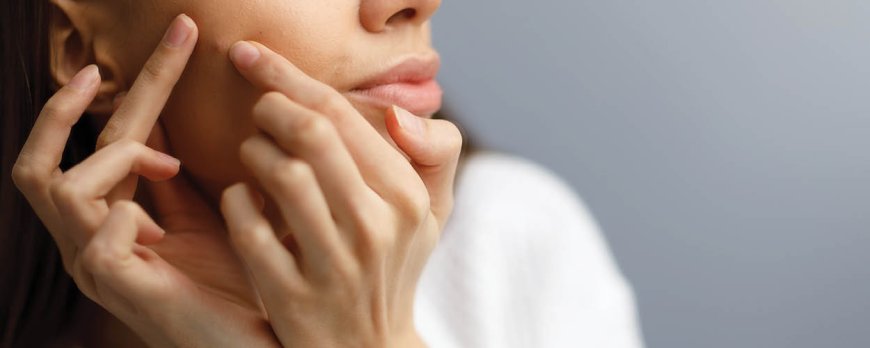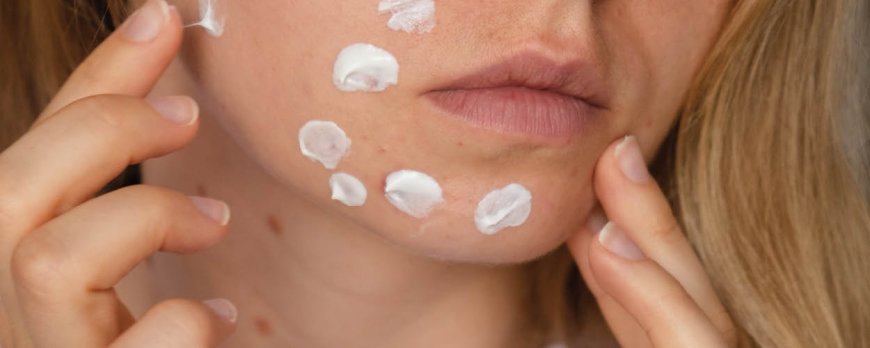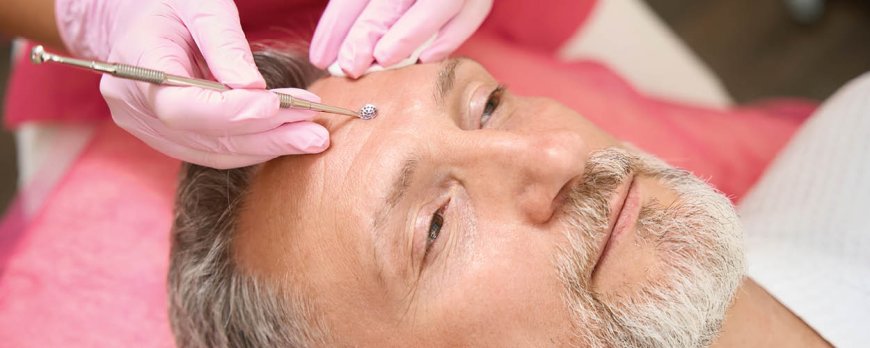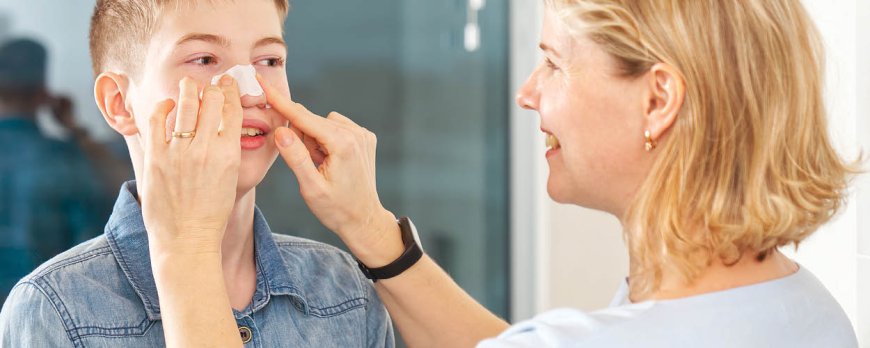How do I clear up my acne?
Searching for an answer to 'How do I clear up my acne?' Explore expert advice, tips and proven remedies for flawless skin in our detailed guide.

How do I clear up my acne?
Dealing with acne can be frustrating, but with the right acne treatment, remedies, and skincare routine, you can achieve clearer skin. There are several tips and remedies that can be tried to effectively clear up acne.
First, it is important to give acne treatments at least 4 weeks to work and avoid using different products too frequently as this can worsen acne. It is also beneficial to attack the different causes of acne by using multiple acne-fighting ingredients.
Following directions and washing the face twice a day and after sweating can help prevent acne. Scrubbing the face should be avoided as it can irritate the skin. Using non-comedogenic or non-acnegenic skincare products and cosmetics can prevent acne breakouts. It is important to resist touching, picking, and popping acne as this can worsen the condition and spread bacteria.
Acne medication should be spread on all acne-prone skin, not just on blemishes. If acne persists despite these measures, it is advisable to seek the help of a dermatologist. Severe acne may require treatment with antibiotics, isotretinoin, birth control pills, or other procedures such as acne removal or low-dose prednisone.
In addition to conventional treatments, some home remedies can be tried, such as apple cider vinegar, zinc supplements, honey and cinnamon masks, tea tree oil spot treatment, green tea application, and witch hazel. These remedies have varying levels of scientific evidence supporting their effectiveness, so it is important to keep in mind that results may vary.
Key Takeaways:
- Give acne treatments at least 4 weeks to work and avoid using different products too frequently.
- Attack the different causes of acne by using multiple acne-fighting ingredients.
- Follow directions and wash your face twice a day and after sweating.
- Avoid scrubbing your face and use non-comedogenic or non-acnegenic skincare products.
- Resist touching, picking, and popping acne to prevent worsening and bacterial spread.

Understanding Acne Causes and Prevention
Before diving into acne treatments, it's important to understand the causes behind acne breakouts and learn how to prevent them. Acne is a result of various factors, including hormonal changes, excess sebum production, clogged pores, and bacterial overgrowth. By addressing these underlying causes, you can effectively manage and prevent acne.
Here are some key factors to consider:
- Hormonal Changes: Hormonal fluctuations, especially during puberty, menstruation, or pregnancy, can trigger acne breakouts. Increased androgen levels stimulate the sebaceous glands, leading to excess oil production and clogged pores. Understanding and managing hormonal changes can help prevent acne.
- Excess Sebum Production: Sebum is an oily substance produced by the sebaceous glands that keeps our skin moisturized. However, excessive sebum production can contribute to acne development. Keeping the skin clean and using non-comedogenic or non-acnegenic skincare products can help regulate sebum production.
- Clogged Pores: Dead skin cells and excess sebum can accumulate in the hair follicles, leading to clogged pores. This creates an ideal environment for bacteria to thrive and cause inflammation. Regular exfoliation and using products with salicylic acid or benzoyl peroxide can help prevent clogged pores.
- Bacterial Overgrowth: Propionibacterium acnes, a bacteria commonly found on the skin, can multiply rapidly and cause acne when trapped in clogged pores. Maintaining good hygiene, avoiding touching the face, and using products with antibacterial properties can help manage bacterial overgrowth.
By implementing a comprehensive skincare routine that addresses these factors, you can effectively prevent acne breakouts and promote healthier skin.
Effective Acne Treatment Tips
Discover proven tips and practices to effectively treat acne and achieve clearer skin. When it comes to clearing up acne, consistency is key. Give acne treatments at least 4 weeks to work, as it takes time for results to show. Avoid the temptation to switch products frequently, as this can aggravate the skin and make acne worse.
Attacking the different causes of acne is essential for effective treatment. Use products that contain acne-fighting ingredients such as benzoyl peroxide, salicylic acid, or retinoids. These ingredients help to unclog pores, reduce inflammation, and promote cell turnover, resulting in clearer skin.
Following a proper skincare routine is crucial for preventing acne breakouts. Wash your face twice a day with a gentle cleanser and be sure to cleanse after sweating. However, avoid scrubbing your face vigorously, as this can irritate the skin and worsen acne. Opt for non-comedogenic or non-acnegenic skincare products and cosmetics to prevent clogged pores.
One important tip is to resist the urge to touch, pick, or pop your acne. These actions can worsen the condition and spread bacteria, leading to more breakouts. When applying acne medication, make sure to cover all acne-prone areas, not just individual blemishes. If acne persists despite these measures, it's advisable to consult a dermatologist who can provide personalized treatment options based on your specific needs and severity of acne.
While conventional treatments are commonly used, there are also home remedies that can be tried. Apple cider vinegar, zinc supplements, honey and cinnamon masks, tea tree oil spot treatment, green tea application, and witch hazel are some of the natural remedies that have been used for acne. However, it's important to note that the scientific evidence supporting their effectiveness varies. It's always wise to keep in mind that results may vary and consult with a healthcare professional before trying any new remedies.
Best Practices for Acne Skincare
Learn the best practices for acne skincare to maintain a healthy complexion and minimize acne breakouts. Follow these tips and incorporate them into your daily routine to effectively manage acne-prone skin:
- Be patient: Give acne treatments at least 4 weeks to work. Avoid the temptation of constantly switching products, as this can worsen acne and disrupt your skin's balance.
- Attack acne from different angles: Use multiple acne-fighting ingredients to target the different causes of acne. Look for products that contain ingredients like benzoyl peroxide, salicylic acid, or retinoids.
- Cleanse gently: Wash your face twice a day using a gentle cleanser specifically formulated for acne-prone skin. Avoid harsh scrubbing, as it can irritate the skin and worsen acne.
- Moisturize wisely: Use oil-free, non-comedogenic or non-acnegenic moisturizers to hydrate your skin without clogging pores. Look for products that are specifically labeled as suitable for acne-prone skin.
- Avoid pore-clogging products: Choose non-comedogenic or non-acnegenic cosmetics and skincare products to prevent acne breakouts. These products are specially designed to not clog pores and aggravate acne.
- Hands off: Resist the urge to touch, pick, or pop your acne. It can worsen the condition, introduce bacteria, and potentially lead to scarring.
- Spread acne medication: When applying acne medication, cover all acne-prone areas, not just individual blemishes. This helps prevent future breakouts and ensures comprehensive treatment.
If your acne persists despite following these best practices, it may be time to seek the help of a dermatologist. They can assess your condition and recommend appropriate treatments based on the severity of your acne. Severe cases may require prescription medications like antibiotics, isotretinoin, or birth control pills, or procedures such as acne removal or low-dose prednisone.
In addition to conventional treatments, there are some home remedies that you can consider trying. However, it's important to note that the scientific evidence supporting the effectiveness of these remedies varies. Some popular home remedies for acne include apple cider vinegar, zinc supplements, honey and cinnamon masks, tea tree oil spot treatment, green tea application, and witch hazel. Keep in mind that results may vary, and it's always advisable to consult with a healthcare professional before trying any new treatments.

The Dos and Don'ts of Dealing with Acne
Find out what you should and shouldn't do when dealing with acne to promote healing and prevent further breakouts.
Do:
- Give acne treatments at least 4 weeks to work. Patience is key when it comes to seeing results.
- Attack the different causes of acne by using multiple acne-fighting ingredients. Look for products that contain salicylic acid, benzoyl peroxide, or retinoids.
- Wash your face twice a day and after sweating. Use a gentle cleanser and lukewarm water, avoiding scrubbing that can irritate the skin.
- Use non-comedogenic or non-acnegenic skin care products and cosmetics. These won't clog your pores and can help prevent acne breakouts.
- Resist the urge to touch, pick, or pop your acne. This can worsen the condition and spread bacteria, leading to more breakouts.
- Spread acne medication on all acne-prone areas, not just on individual blemishes. This helps prevent new breakouts from forming.
Don't:
- Use too many different products too frequently. This can worsen acne by causing irritation and dryness. Stick to a consistent routine.
- Scrub your face aggressively. This can irritate the skin and lead to more breakouts. Use gentle, circular motions when cleansing.
- Touch, pick, or pop your acne. This can introduce bacteria and cause inflammation, making the acne worse and increasing the risk of scarring.
Please note: If acne persists despite these measures, it's recommended to seek the help of a dermatologist. They can provide further guidance and recommend appropriate treatments, including prescription medications or procedures.
Home remedies:
While conventional treatments are often the most effective for treating acne, some home remedies can be tried as well. These remedies have varying levels of scientific evidence supporting their effectiveness. If you decide to try them, keep in mind that results may vary. Some popular home remedies for acne include:
- Apple cider vinegar
- Zinc supplements
- Honey and cinnamon masks
- Tea tree oil spot treatment
- Green tea application
- Witch hazel
It's important to do your research and use these remedies with caution. If you experience any adverse reactions or if your acne worsens, discontinue use and consult with a healthcare professional.

Seeking Professional Help for Persistent Acne
If your acne persists despite your best efforts, it may be time to consult a dermatologist who can provide additional treatment options. Dermatologists are specialists in skin health and can offer expert advice and personalized solutions to help manage and treat persistent acne. Here are some reasons why seeking professional help may be beneficial:
- Accurate Diagnosis: A dermatologist can accurately diagnose the type and severity of your acne. This is important because the treatment approach may vary depending on whether you have mild, moderate, or severe acne.
- Prescription Medications: Dermatologists can prescribe medications that are more potent and effective than over-the-counter treatments. These may include topical creams or gels containing retinoids, antibiotics, or combination products. In some cases, oral medications such as antibiotics, hormonal therapy, or isotretinoin may be recommended.
- Procedures: If your acne is resistant to traditional treatments, dermatologists can perform procedures such as acne removal, chemical peels, or laser therapy to help reduce breakouts and improve the appearance of your skin.
- Personalized Skincare Regimen: A dermatologist can tailor a skincare regimen specifically for your skin type and acne concerns. They can recommend suitable cleansers, moisturizers, and sunscreens that won't clog pores or exacerbate acne.
Remember, everyone's skin is different, and what works for one person may not work for another. By consulting a dermatologist, you can receive personalized advice and treatment options that are tailored to your specific needs, helping you achieve clearer and healthier skin.
Conventional and Alternative Acne Treatments
Discover a range of conventional and alternative acne treatments that can help you achieve clearer skin. When it comes to treating acne, there are various options available, from over-the-counter products to professional procedures. Here are some options to consider:
Conventional Acne Treatments:
- Topical medications: These include creams, gels, and lotions that contain ingredients like benzoyl peroxide, salicylic acid, or retinoids. They help unclog pores, reduce inflammation, and kill acne-causing bacteria.
- Oral medications: Antibiotics and birth control pills can be prescribed by a dermatologist to help control acne. These medications work by targeting the underlying causes of acne, such as hormonal imbalances or bacterial growth.
- Procedures: Dermatologists may recommend procedures like chemical peels, microdermabrasion, or laser therapy to help improve acne symptoms and reduce scarring.
Alternative Acne Treatments:
- Tea tree oil: Known for its antibacterial properties, tea tree oil can be applied topically to reduce inflammation and kill acne-causing bacteria.
- Apple cider vinegar: Diluted apple cider vinegar can be used as a natural toner to help balance the skin's pH and reduce acne-causing bacteria.
- Zinc supplements: Taking zinc supplements orally can help regulate oil production and reduce inflammation, improving acne symptoms.
It's important to note that the effectiveness of alternative acne treatments may vary, and it's always best to consult with a healthcare professional before trying any new treatment. Additionally, consistency and patience are key when it comes to treating acne. Results may take time, so it's important to stick to a skincare routine and follow the recommended treatment plan.
Home Remedies for Acne
Explore natural home remedies that may help in clearing up acne and promoting healthier skin. When dealing with acne, it is important to consider these alternative treatments and remedies, in addition to conventional methods, to find what works best for your skin.
1. Apple Cider Vinegar: Known for its antibacterial properties, apple cider vinegar can help kill acne-causing bacteria and balance the skin's pH level. Dilute the vinegar with water and apply it to the affected areas using a cotton pad. Leave it on for a few minutes before rinsing it off. Be cautious as undiluted apple cider vinegar can cause skin irritation.
2. Zinc Supplements: Zinc is an important nutrient that plays a role in reducing inflammation and promoting healthy skin. Taking zinc supplements may help regulate oil production and reduce the severity of acne. Consult with a healthcare professional before starting any new supplements.
3. Honey and Cinnamon Masks: Honey has natural antibacterial properties while cinnamon helps improve blood circulation to the skin. Mix honey and cinnamon together to create a paste and apply it to clean skin. Leave it on for 10-15 minutes before rinsing it off. This mask can help reduce inflammation and soothe acne-prone skin.
4. Tea Tree Oil Spot Treatment: Tea tree oil is known for its antimicrobial properties and can be an effective spot treatment for acne. Dilute tea tree oil with a carrier oil, such as coconut oil, and apply it to individual acne blemishes using a cotton swab. Leave it on overnight and rinse off in the morning. It is important to patch test before using tea tree oil directly on the skin as it may cause irritation in some individuals.
5. Green Tea Application: Green tea contains antioxidants that can help reduce inflammation and fight acne-causing bacteria. Brew green tea and allow it to cool. Apply the cooled tea to the skin using a cotton pad or spritz it on as a refreshing facial mist. Green tea can also be consumed orally to reap its health benefits.
6. Witch Hazel: Witch hazel has astringent properties that can help remove excess oil from the skin and reduce inflammation. Apply witch hazel to a cotton pad and gently wipe it over clean skin. This can be particularly helpful for oily and acne-prone skin types.
It is important to note that while these home remedies have been reported to have acne-clearing benefits, results may vary from person to person. It is always best to consult with a dermatologist or healthcare professional for personalized advice and treatment options for persistent or severe acne. Consistency, patience, and a holistic approach to skincare can lead to clearer, healthier skin.

Conclusion
In conclusion, achieving clearer skin involves a combination of effective acne treatments, skincare practices, and, in some cases, the guidance of a dermatologist. When dealing with acne, it is important to be patient and give treatments at least 4 weeks to work. Avoid the temptation to use different products too frequently, as this can actually worsen acne. Instead, focus on attacking the different causes of acne by incorporating multiple acne-fighting ingredients into your skincare routine.
Following directions and washing your face twice a day, as well as after sweating, can help prevent acne breakouts. However, it is crucial to avoid excessive scrubbing, as this can irritate the skin and make acne worse. Opt for non-comedogenic or non-acnegenic skincare products and cosmetics, as these are less likely to clog pores and lead to acne breakouts.
Resisting the urge to touch, pick, and pop acne is also vital, as this can worsen the condition and spread bacteria. Instead, focus on applying acne medication to all acne-prone skin, not just on individual blemishes, to prevent future breakouts. If acne persists despite these measures, it is advisable to seek the help of a dermatologist, who can provide further guidance and prescribe appropriate treatments.
In addition to conventional treatments, some home remedies can be tried to complement acne skincare. While these remedies, such as apple cider vinegar, zinc supplements, honey and cinnamon masks, tea tree oil spot treatment, green tea application, and witch hazel, have varying levels of scientific evidence supporting their effectiveness, it is important to keep in mind that results may vary. It is always recommended to consult with a healthcare professional before trying any new remedies or treatments.
FAQ
How long should I wait for acne treatments to work?
It is important to give acne treatments at least 4 weeks to work. Results may vary depending on the individual.
Can using different products frequently worsen acne?
Yes, using different products too frequently can actually worsen acne. Stick to a consistent skincare routine and avoid frequent product switching.
How can I attack the different causes of acne?
To combat the different causes of acne, it is beneficial to use multiple acne-fighting ingredients in your skincare routine.
How often should I wash my face to prevent acne?
Wash your face twice a day and after sweating to help prevent acne breakouts.
Should I scrub my face to get rid of acne?
No, scrubbing the face can irritate the skin and worsen acne. Gentle washing is recommended.
What kind of skincare products should I use to prevent acne?
Use non-comedogenic or non-acnegenic skin care products and cosmetics to prevent acne breakouts.
Is it bad to touch or pick at acne?
Yes, touching, picking, and popping acne can worsen the condition and spread bacteria. Avoid these practices.
Should I only apply acne medication to blemishes?
No, acne medication should be spread on all acne-prone skin, not just on blemishes, to prevent future breakouts.
When should I seek the help of a dermatologist for acne?
If acne persists despite at-home treatments, it is advisable to seek the help of a dermatologist for professional evaluation and treatment options.
What are some alternative acne treatments?
Alternative acne treatments include medications such as antibiotics, isotretinoin, and birth control pills, as well as procedures like acne removal or low-dose prednisone.
Are there any home remedies for acne?
Yes, some home remedies that can be tried include apple cider vinegar, zinc supplements, honey and cinnamon masks, tea tree oil spot treatment, green tea application, and witch hazel. However, results may vary and it's important to be aware of the scientific evidence supporting their effectiveness.



































































































































